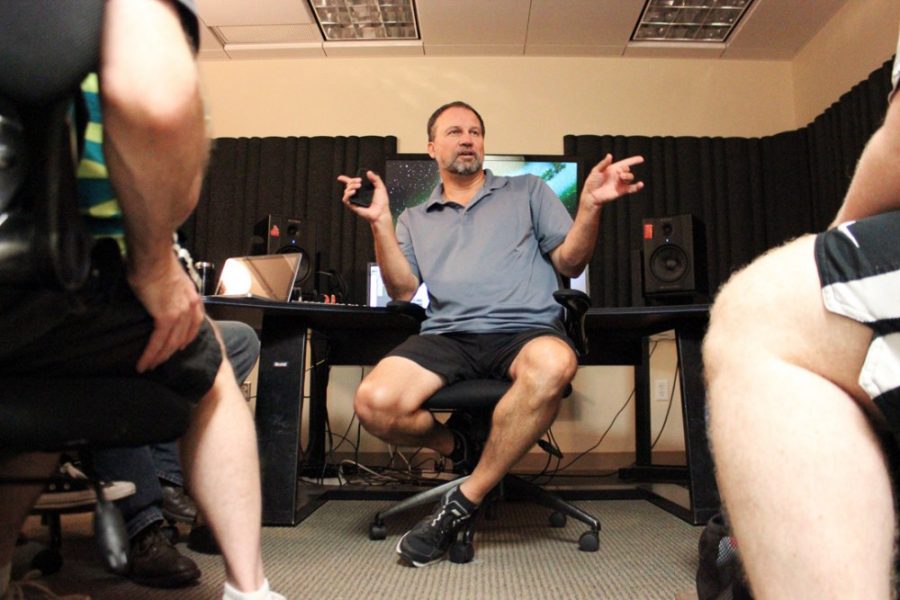Professional film and television sound mixer Scott Weber visited the UA on Thursday and Friday to share his experiences in the sound industry with students.
Everyone loves a great film, but oftentimes, visuals take precedent over audio. In the real world, sound is a natural occurrence, so when viewers hear footsteps or the pages of a book being turned in a film, they assume it to be natural as well.
What many viewers don’t know is that every sound effect, from a loud clap of thunder to the scratching of a pen on a piece of paper, must be added into a film during post-production. When filming a movie or television show, dialogue is isolated and recorded separately in order to ensure it comes out clear and can be adjusted easily. This process automatically eliminates any natural sound effects, so in order to keep the realism of a production intact, a sound mixer must edit in sound.
Weber has been in the sound business for over 25 years and has contributed his talents to an array of films and television shows that include “Who Framed Roger Rabbit” and “Lost.” After attending school at La Sierra University and Dick Grove School of Music and receiving his associate degree in sound engineering, Weber got his first job at a recording studio.
“I definitely worked my way through the ranks,” Weber said. “I was always willing to do whatever they needed me to and more.”
While trying to work his way to bigger and better things, Weber made sure to learn as much as he possibly could about the equipment and software used in his profession, and he took every opportunity given to him.
His wide array of abilities opened up many doors as he transitioned into film and television sound. During his early years in the medium, Weber contributed his skills and knowledge to Matt Groening’s original “The Simpsons” shorts, the predecessor to the extremely popular animated show. Weber also spent 21 years at Walt Disney Studios in various positions in the sound department, where he worked on a variety of programs.
Weber was a foreign language mixer for several years and mixed sound for foreign Disney animations. When animated films change language, their sound effects have to be mixed again so they sound as close to the original as possible in order to allow animated films to cross borders.
While in this foreign language mixer position, Weber contributed to Disney features such as “Cars,” “The Incredibles,” “Ratatouille” and “Monsters Inc.” in their transition to Spanish, Japanese and more.
One of Weber’s most well-known credits, however, is for the television series “Lost” that aired on ABC from 2004 to 2010. Weber said his experiences while mixing sound for such a complicated television show were difficult but enjoyable.
“After mixing ‘Lost,’ anything’s easy,” Weber told the students at his talk on Thursday. In 2008, the mixing team for “Lost” won the Emmy Award for Outstanding Sound Mixing for a Comedy or Drama Series, which Weber said he considers his biggest accomplishment in his work.
After his 21 years at Disney, the production studios decided to outsource post-production and essentially got rid of Weber’s department. Because of his talent and experience in the field, however, Weber quickly found a position in sound at Smart Post Sound where he is now, among other things, sound mixing for the television program “Person of Interest.”
Weber’s extensive background in the field made him the ideal person to give a talk and workshop to aspiring sound mixers and designers.
During his workshop, Weber discussed his experiences, demonstrated the Pro Tools program he uses, and gave students valuable advice on how to navigate the industry.
“Make sure you love what you do,” Weber added, “and give it 200 percent.”
_______________
Follow Victoria Pereira on Twitter.









